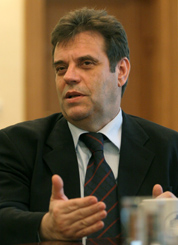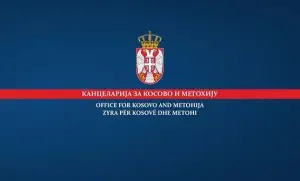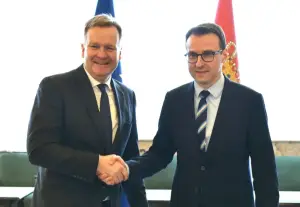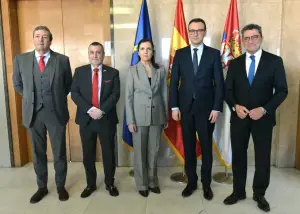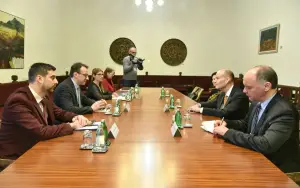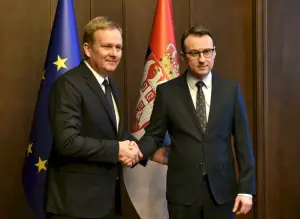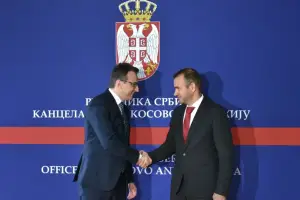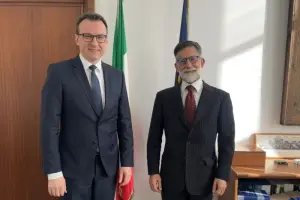Q:
A:
Serbia will only accept compromise on Kosovo-Metohija
Belgrade,
29 April 2005
Serbian Prime Minister Vojislav Kostunica stated that a compromise on Kosovo-Metohija was the only acceptable solution for Belgrade and that it was necessary to find a solution that acknowledges the interests of both peoples through patient dialogue.
In an interview to the Tanjug news agency, Kostunica underlined that the solution can be just and permanent only through a compromise and agreement between Serbs and Albanians, which means that there can be no absolute winners or losers.
Kostunica pointed out that it is clear that there can be neither a solution nor a compromise if one side gets everything and the other loses everything. He went on to say that it is Serbia’s responsibility to preserve stability in the country and the entire region and that Serbia strongly favours the principle of the permanence of international borders, as the most reliable approach to preserving and improving stability in the region.
He said that the Serbian government will endeavour to base every solution for Kosovo-Metohija on the widest consensus in the country, just as it was done in the previous period and reminded of the regular consultations of the state leadership including the State Union of Serbia-Montenegro President, the Foreign Minister and the head of the Coordinating Centre.
Speaking of a possible model for the solution, the Serbian Prime Minister added that a compromise solution is needed based on the formula “more than autonomy, less than independence”.
This solution still needs to be given a legal framework, because solutions for complex multiethnic relations are often outside the existing rules, that are new and unconventional, Kostunica said while reminding that Serbia-Montenegro is surrounded by such solutions.
Kostunica explained that all solutions after the disintegration of the former Yugoslavia are atypical and not to be found among classical legal textbook cases, such as the case of Bosnia-Herzegovina, where there are two states within one, a unification model which for the first time used a philosophical term in order to explain the concept of those two states. They are not confederal or federal units, rather “entities”, he added.
According to him, relations between Serbia and Montenegro are also specific as the union is neither a classic federal one nor a confederal state, noting that the “Ohrid Agreement” in Macedonia is also interesting.
Commenting the recent meeting of Contact Group and Serbia-Montenegro representatives in Belgrade, Kostunica said that the Contact Group, besides calling for a dialogue between Belgrade and Pristina, had a “wider mandate”, and most importantly the issue of the beginning of assessments of standards was initiated. The discussion on standards includes the Contact Group, UNMIK and provisional self-government institutions in Kosovo and of course, Belgrade, explained the Prime Minister and underlined that the issue of standards, in a certain sense was above all other issues.
The assessment of standards, the precision, responsibility and objectivity of these assessments will present a condition for whether and when the discussion on the status begins as well as the resulting solution regarding the future status of the province, Kostunica emphasised.
According to him, the condition of human rights is far from satisfactory and the standards have not been fulfilled. “For us the present state of human rights in Kosovo-Metohija is completely unacceptable. We only need to remember March 17, 2004. Prior to that we had slow and partial ethnic cleansing in Kosovo-Metohija, but on March 17 there was a well organised and wide-scale attempt at complete ethnic cleansing of Serbs and other non-Albanians in Kosovo-Metohija”, he said.
Kostunica added that at this moment we do not need to make a long list of daily human rights violations in Kosovo-Metohija, we need only to focus on one right, such as for example the freedom of movement.
He underlined that for Serbia, the principal question was the return of expelled persons to their homes because those people simply have an unalienable right to return and live in their homes. “No one can ignore the simple truth that today in Europe there is one nation which cannot return to live in their homes. This should be the first and most basic standard. The moment when the majority of the two-thirds of Serbs who lived in Kosovo-Metohija and left after 1999 returns, we will be able to claim that the standard of security, safety, and normal living conditions has partly been fulfilled”, said the Serbian Prime Minister.
He also said that when those people are able to freely move around the entire province, that standard will be completely fulfilled, while for now there is a drastic example of the lack of freedom of movement.
According to him, if there are attempts to assess the situation as acceptable, this will cast grave doubt on the possible beginning of talks on the status. Things will not go so smoothly, and besides, there are more relevant deciding factors, Kostunica warned and assessed that it would be false to attempt to prove that with the existence of an administration and the functioning of institutions that the human rights of Serbs and other non-Albanians in the province are protected.
As long as such a small Serb community survives in Kosovo-Metohija, there is some form of a multiethnic society. Otherwise, Kosovo will become monoethnic, which would be a great failure and shame for the international community, said the Prime Minister.
Regarding current attempts to achieve Kosovo’s independence and the activity of the International Commission on the Balkans and the International Crisis Group, Kostunica said that they were against UN Security Council Resolution 1244 as well as the later policy formulated by the UN in Kosovo-Metohija, when they determined the “standards prior to status” policy in 2002.
The Commission and the International Crisis Group as well as certain interested individuals claim that the standards are not going well and that the situation is not satisfactory and would not change significantly, and that stability would be achieved by “turning the situation on its head” by first resolving the question of status, and then hope that the issue of standards will resolve itself on its own, he explained.
Kostunica reminded that the International Commission on the Balkans with Leo Tindemans in 1996 assessed the situation and drew up a report entitled “Unfinished Peace”, where it then already predicted independence for Kosovo-Metohija.
It is characteristic of such positions, underlined the Serbian Prime Minister, to stress a false dilemma that we must chose between becoming an EU member and preserving Kosovo-Metohija. This is against Resolution 1244 as well as European policy, as Europe has accepted the entry of the state union with Kosovo-Metohija under UN administration. If one considers the statement by the Council of Europe Secretary General Terry Davis, it is seen that there is a policy which takes into consideration international justice and sees the solution for the position of the province within the state union without bringing the territorial integrity of Serbia-Montenegro into question, specified Kostunica.
Assessing that there is outright support for the idea of independence, with certain interests in the background, the Prime Minister said that he was not concerned by the position of Commission member, Serbian MP and former Foreign Minister Goran Svilanovic. “For me the only relevant thing is that he is just one of the 250 MPs who believes that Kosovo should be independent. I am convinced that a consensus will be preserved on these most basic issues and that there is unity among the Serbian parliament, the executive government in Serbian and the State Union of Serbia-Montenegro, Kostunica added.
According to Kostunica, it is abundantly clear that independence for Kosovo-Metohija cannot be an acceptable solution for Serbia and the State Union of Serbia-Montenegro, and that this solution could only be imposed, therefore making it not only unacceptable, but also unjust. He emphasised that the issue of status is not an internal issue of Serbia-Montenegro and Serbia but also one of regional stability.
Kostunica said that Serbia and Serbia-Montenegro have always shown readiness to accept a constructive approach and participate in the dialogue process and reminded that in October 2000, as President of the Federal Republic of Yugoslavia, after the democratic changes in the country he called upon the then and current Kosovo-Metohija President Ibrahim Rugova to talks, an invitation now once again extended by Serbian President Boris Tadic, but that this, as was then, had been turned down.
Kostunica says that Serbia has shown that it is ready and prepared for dialogue and is patiently waiting for a positive response to the invitation. “I am convinced that if the standards are improved then the dialogue will begin on its own accord”, he said and added that it is important to begin technical talks within the four working groups. However, as he said, there are still open issues considering the very important working group on decentralisation.
Belgrade must take part in this working group and it has warned UNMIK chief Soren Jessen-Petersen, who has so far tried to marginalise the role of Belgrade in this group and reduce it to an advisory capacity, the Prime Minister pointed out. He repeated that only a complete group with representatives of Belgrade and Serbs from Kosovo-Metohija can achieve certain results and added that as long as this position is not accepted, the working group will not be able to truly begin its work and our participation will not make any sense.
Kostunica pointed out that it is clear that there can be neither a solution nor a compromise if one side gets everything and the other loses everything. He went on to say that it is Serbia’s responsibility to preserve stability in the country and the entire region and that Serbia strongly favours the principle of the permanence of international borders, as the most reliable approach to preserving and improving stability in the region.
He said that the Serbian government will endeavour to base every solution for Kosovo-Metohija on the widest consensus in the country, just as it was done in the previous period and reminded of the regular consultations of the state leadership including the State Union of Serbia-Montenegro President, the Foreign Minister and the head of the Coordinating Centre.
Speaking of a possible model for the solution, the Serbian Prime Minister added that a compromise solution is needed based on the formula “more than autonomy, less than independence”.
This solution still needs to be given a legal framework, because solutions for complex multiethnic relations are often outside the existing rules, that are new and unconventional, Kostunica said while reminding that Serbia-Montenegro is surrounded by such solutions.
Kostunica explained that all solutions after the disintegration of the former Yugoslavia are atypical and not to be found among classical legal textbook cases, such as the case of Bosnia-Herzegovina, where there are two states within one, a unification model which for the first time used a philosophical term in order to explain the concept of those two states. They are not confederal or federal units, rather “entities”, he added.
According to him, relations between Serbia and Montenegro are also specific as the union is neither a classic federal one nor a confederal state, noting that the “Ohrid Agreement” in Macedonia is also interesting.
Commenting the recent meeting of Contact Group and Serbia-Montenegro representatives in Belgrade, Kostunica said that the Contact Group, besides calling for a dialogue between Belgrade and Pristina, had a “wider mandate”, and most importantly the issue of the beginning of assessments of standards was initiated. The discussion on standards includes the Contact Group, UNMIK and provisional self-government institutions in Kosovo and of course, Belgrade, explained the Prime Minister and underlined that the issue of standards, in a certain sense was above all other issues.
The assessment of standards, the precision, responsibility and objectivity of these assessments will present a condition for whether and when the discussion on the status begins as well as the resulting solution regarding the future status of the province, Kostunica emphasised.
According to him, the condition of human rights is far from satisfactory and the standards have not been fulfilled. “For us the present state of human rights in Kosovo-Metohija is completely unacceptable. We only need to remember March 17, 2004. Prior to that we had slow and partial ethnic cleansing in Kosovo-Metohija, but on March 17 there was a well organised and wide-scale attempt at complete ethnic cleansing of Serbs and other non-Albanians in Kosovo-Metohija”, he said.
Kostunica added that at this moment we do not need to make a long list of daily human rights violations in Kosovo-Metohija, we need only to focus on one right, such as for example the freedom of movement.
He underlined that for Serbia, the principal question was the return of expelled persons to their homes because those people simply have an unalienable right to return and live in their homes. “No one can ignore the simple truth that today in Europe there is one nation which cannot return to live in their homes. This should be the first and most basic standard. The moment when the majority of the two-thirds of Serbs who lived in Kosovo-Metohija and left after 1999 returns, we will be able to claim that the standard of security, safety, and normal living conditions has partly been fulfilled”, said the Serbian Prime Minister.
He also said that when those people are able to freely move around the entire province, that standard will be completely fulfilled, while for now there is a drastic example of the lack of freedom of movement.
According to him, if there are attempts to assess the situation as acceptable, this will cast grave doubt on the possible beginning of talks on the status. Things will not go so smoothly, and besides, there are more relevant deciding factors, Kostunica warned and assessed that it would be false to attempt to prove that with the existence of an administration and the functioning of institutions that the human rights of Serbs and other non-Albanians in the province are protected.
As long as such a small Serb community survives in Kosovo-Metohija, there is some form of a multiethnic society. Otherwise, Kosovo will become monoethnic, which would be a great failure and shame for the international community, said the Prime Minister.
Regarding current attempts to achieve Kosovo’s independence and the activity of the International Commission on the Balkans and the International Crisis Group, Kostunica said that they were against UN Security Council Resolution 1244 as well as the later policy formulated by the UN in Kosovo-Metohija, when they determined the “standards prior to status” policy in 2002.
The Commission and the International Crisis Group as well as certain interested individuals claim that the standards are not going well and that the situation is not satisfactory and would not change significantly, and that stability would be achieved by “turning the situation on its head” by first resolving the question of status, and then hope that the issue of standards will resolve itself on its own, he explained.
Kostunica reminded that the International Commission on the Balkans with Leo Tindemans in 1996 assessed the situation and drew up a report entitled “Unfinished Peace”, where it then already predicted independence for Kosovo-Metohija.
It is characteristic of such positions, underlined the Serbian Prime Minister, to stress a false dilemma that we must chose between becoming an EU member and preserving Kosovo-Metohija. This is against Resolution 1244 as well as European policy, as Europe has accepted the entry of the state union with Kosovo-Metohija under UN administration. If one considers the statement by the Council of Europe Secretary General Terry Davis, it is seen that there is a policy which takes into consideration international justice and sees the solution for the position of the province within the state union without bringing the territorial integrity of Serbia-Montenegro into question, specified Kostunica.
Assessing that there is outright support for the idea of independence, with certain interests in the background, the Prime Minister said that he was not concerned by the position of Commission member, Serbian MP and former Foreign Minister Goran Svilanovic. “For me the only relevant thing is that he is just one of the 250 MPs who believes that Kosovo should be independent. I am convinced that a consensus will be preserved on these most basic issues and that there is unity among the Serbian parliament, the executive government in Serbian and the State Union of Serbia-Montenegro, Kostunica added.
According to Kostunica, it is abundantly clear that independence for Kosovo-Metohija cannot be an acceptable solution for Serbia and the State Union of Serbia-Montenegro, and that this solution could only be imposed, therefore making it not only unacceptable, but also unjust. He emphasised that the issue of status is not an internal issue of Serbia-Montenegro and Serbia but also one of regional stability.
Kostunica said that Serbia and Serbia-Montenegro have always shown readiness to accept a constructive approach and participate in the dialogue process and reminded that in October 2000, as President of the Federal Republic of Yugoslavia, after the democratic changes in the country he called upon the then and current Kosovo-Metohija President Ibrahim Rugova to talks, an invitation now once again extended by Serbian President Boris Tadic, but that this, as was then, had been turned down.
Kostunica says that Serbia has shown that it is ready and prepared for dialogue and is patiently waiting for a positive response to the invitation. “I am convinced that if the standards are improved then the dialogue will begin on its own accord”, he said and added that it is important to begin technical talks within the four working groups. However, as he said, there are still open issues considering the very important working group on decentralisation.
Belgrade must take part in this working group and it has warned UNMIK chief Soren Jessen-Petersen, who has so far tried to marginalise the role of Belgrade in this group and reduce it to an advisory capacity, the Prime Minister pointed out. He repeated that only a complete group with representatives of Belgrade and Serbs from Kosovo-Metohija can achieve certain results and added that as long as this position is not accepted, the working group will not be able to truly begin its work and our participation will not make any sense.

